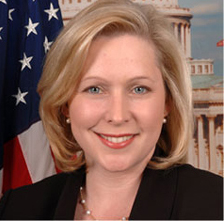
U.S. Senator Kirsten Gillibrand today led a bipartisan group of Senators in calling on House and Senate leadership to include a provision in the Fiscal Year 2018 Appropriations package to prevent the Department of Justice (DOJ) from using any funds to interfere with the implementation of state medical marijuana laws. Senators Rand Paul (R-KY), Catherine Cortez Masto (D-NV), Steve Daines (R-MT), and Cory Booker (D-NJ) signed onto Gillibrand’s letter.
Even though 29 states and the District of Columbia have made marijuana legal to be used as medicine, the federal laws still state that marijuana is illegal in any form. The provision Gillibrand is pushing will block federal government from spending any money to enforce the federal law regarding marijuana in states that have passed medical marijuana laws. This provision has been included in every appropriations bill since 2014, but was recently blocked in the House.
“Since this provision was first passed in 2014, it has protected patients, providers, and businesses who are acting in compliance with their states’ laws from federal prosecution… Each year, this important provision has continuously garnered strong bipartisan support,” wrote the Senators. “We respectfully urge you to include in the final FY18 Appropriations package the below language adopted by the Senate Appropriations Committee in July 2017 by voice vote during its markup of the FY’ 18 CJS appropriations bill.”
In June, Senator Gillibrand also reintroduced a bipartisan bill that would allow Americans to access medical marijuana in states where it is legal without fear of federal prosecution. The Compassionate Access, Research Expansion and Respect States (CARERS) Act would amend federal law to allow states to set their own medical marijuana policies. This bill would also permit doctors with the Department of Veterans Affairs to recommend medical marijuana to veterans to treat serious injuries and chronic conditions. The legislation does not legalize medical marijuana in all 50 states; rather, it respects the states’ decisions to legalize medical marijuana and prevents federal law enforcement from prosecuting patients, doctors, and caregivers in those states.
The full text of the Senators’ letter is available for download here and below:
December 22, 2017
Dear Leader McConnell, Leader Schumer, Speaker Ryan, and Leader Pelosi,
We write to express our support for the protection of states’ medical marijuana programs from interference by the federal government. We thank you for all of your past efforts on this issue, and ask that as you continue to work with the Appropriations Committees on a Fiscal Year (FY) 2018 appropriations bill to fund the government beyond January 19, 2018, you include the provision that protects medical marijuana laws in almost every state.
Since this provision was first passed in 2014, it has protected patients, providers, and businesses who are acting in compliance with their states’ laws from federal prosecution. These protections extend to 46 states, the District of Columbia, Guam, and Puerto Rico, all of which have varying types of medical marijuana programs. Each year, this important provision has continuously garnered strong bipartisan support.
We respectfully urge you to include in the final FY18 Appropriations package the below language adopted by the Senate Appropriations Committee in July by voice vote during its markup of the FY 18 CJS appropriations bill:
None of the funds made available under this Act to the Department of Justice may be used, with respect to any of the States of Alabama, Alaska, Arizona, Arkansas, California, Colorado, Connecticut, Delaware, Florida, Georgia, Hawaii, Illinois, Indiana, Iowa, Kentucky, Louisiana, Maine, Maryland, Massachusetts, Michigan, Minnesota, Mississippi, Missouri, Montana, Nevada, New Hampshire, New Jersey, New Mexico, New York, North Carolina, North Dakota, Ohio, Oklahoma, Oregon, Pennsylvania, Rhode Island, South Carolina, Tennessee, Texas, Utah, Vermont, Virginia, Washington, West Virginia, Wisconsin, and Wyoming, or with respect to the District of Columbia, Guam, or Puerto Rico, to prevent any such State or jurisdiction from implementing a law that authorizes the use, distribution, possession, or cultivation of medical marijuana.
Thank you for your attention to this important matter.

